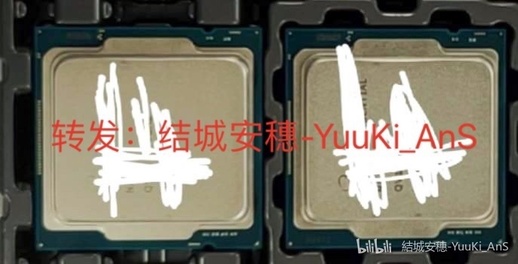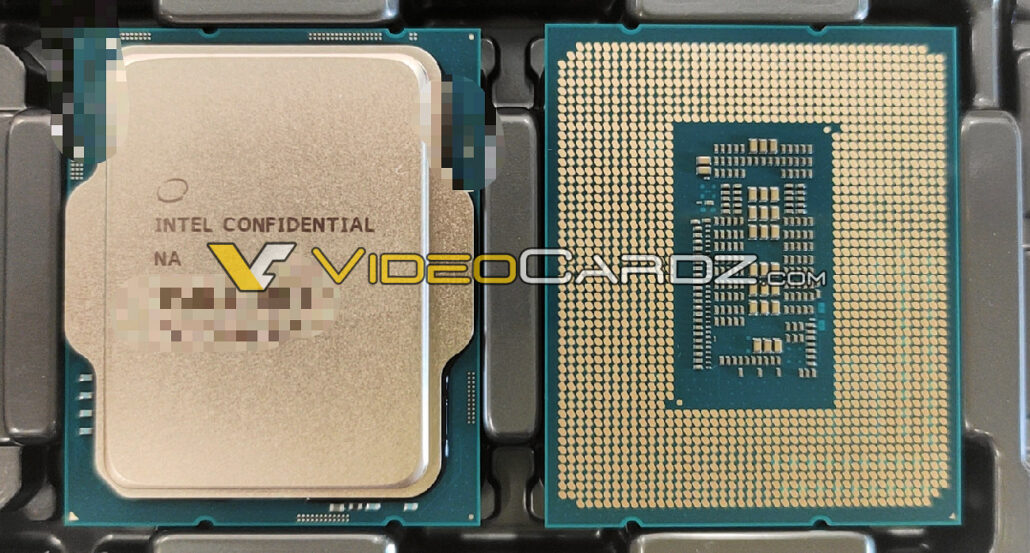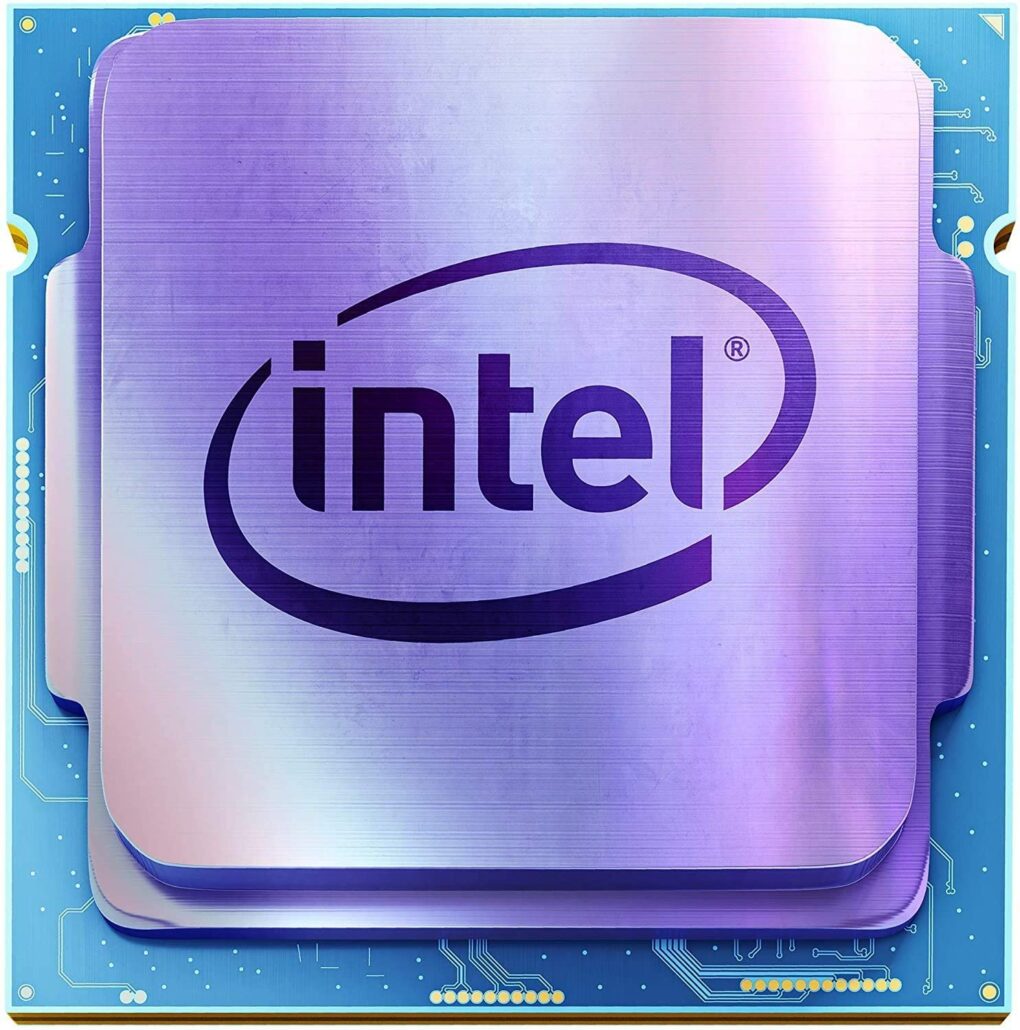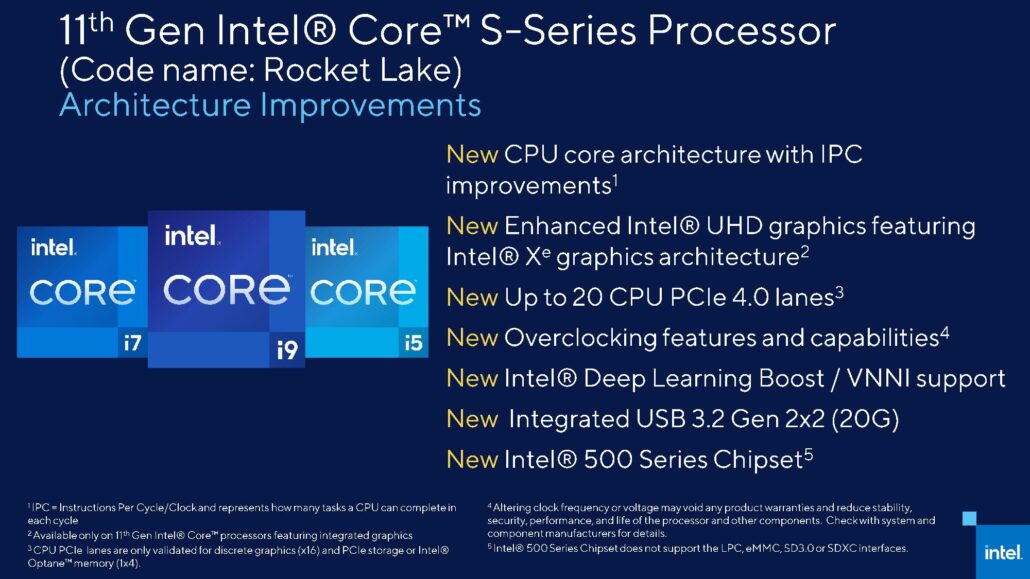
The first pictures of Intel’s 11th Gen Rocket Lake Desktop CPUs have been leaked by YuuKi_Ans at Bilibili. The user who is known for leaking several engineering boards and CPUs before their launch has now given us the first look at Intel’s next-gen successor to its 10th Gen Comet Lake family.
Intel 11th Gen Rocket Lake CPUs Smile For The Camera, Partners Already Testing Early Samples
Update: Videocardz has also posted the first full shots of the 12th Gen Intel Alder Lake CPU. The chip features a rectangular design compared to the square shape which we will see up till Rocket Lake CPUs. The chip comes in a 37.5×45.0mm package versus the 37.5×37.5mm package that we get on existing processors. You can read more details on Alder Lake CPUs and their respective LGA 1700 platform here.

The pictures posted by the leaker show two chips sitting within a CPU tray. According to YuuKi, these are 11th Gen Core Desktop Processors which we know are officially codenamed as Rocket Lake. The 11th Gen Core family will replace the existing 10th Gen Core family and feature brand new cores based on the Cypress Cove core architecture and deliver some insanely fast clocks as per recent rumors.

Talking about the Intel Rocket Lake CPUs pictured in the leak, the two processors seem to feature a slightly different IHS compared to the 10th Generation Comet Lake CPUs. The socket is in the same position as these chips will be compatible with the LGA 1200 socket on both 400-series & also 500-series motherboards. The labels are covered since they can make it easy for Intel to track down the source of these samples and who the leaker got these chips through. However, the CPUs do come with the Intel Confidential marking so these are still ES (Engineering Sample) processors which may feature different specs than the final retail variants.
Our own sources at OEMs and board partners of Intel have told us that they have already received the first batch of ES Rocket Lake CPUs. They are currently testing them with various platforms and configurations which is standard routine for any new generation of processors.
In addition to that, recent tweets by @CapFrameX have suggested that Intel is aiming for some seriously high clock speeds for its Rocket Lake lineup. It is said that current ES CPUs can hit turbo clocks of up to 5.6 GHz on a single core. Now, this is unverified at the moment but it looks like Intel could once again use their core clock advantage to tackle the competition in addition to using the newer Cypress Cove cores. Both of these features should allow Intel to gain back the single-core & gaming lead from AMD’s upcoming Ryzen 5000 family which launches in two days.
Here’s Everything We Know About The 11th Generation Rocket Lake Desktop CPUs
Intel’s Rocket Lake-S desktop CPU platform is expected to feature support on LGA 1200 socket which will make its debut with Comet Lake-S CPUs although on 400-series motherboards. The Intel Rocket Lake-S processors will be launching alongside the 500-series motherboards but it has since been confirmed that LGA 1200 motherboards will offer support for Rocket Lake-S CPUs, especially given the fact that PCIe Gen 4.0 is a prominent feature of Z490 motherboards which would only be enabled with the use of Rocket Lake-S desktop CPUs.

Main features of Intel’s Rocket Lake Desktop CPUs include:
- Increased Performance with new Cypress Cove core architecture
- Up to 8 cores and 16 threads (Double Digit IPC Gains Over Skylake)
- New Xe graphics architecture (Up To 50% higher Performance Than Gen9)
- Increased DDR4 3200 MHz Memory Support
- CPU PCIe 4.0 Lanes (Available on Z490 & Z590 Motherboards)
- Enhanced Display (Integrated HDMI 2.0b, DP1.4a, HBR3)
- Added x4 CPU PCIe Lanes = 20 Total CPU PCIe 4.0 Lanes
- Enhanced Media (12 bit AV1/HVEC, E2E compression)
- CPU Attached Storage or Intel Optane Memory
- New Overclocking Features and Capabilities
- USB Audio offload
- Integrated CNVi & Wireless-AX
- Integrated USB 3.2 Gen 2×2 (20G)
- 2.5Gb Ethernet Discrete LAN
- Discrete Intel Thunderbolt 4 (USB4 Compliant)

The architecture for Rocket Lake CPUs is said to be Cypress Cove which is reportedly a hybrid between the Sunny Cove and Willow Cove design but will feature Xe Gen 12 GPU architecture. We have also been told that the Z590 motherboard series with Thunderbolt 4.0 support will be announced later this year so expect more information on Rocket Lake CPUs in the coming months.
Intel Desktop CPU Generations Comparison:
| Intel CPU Family | Processor Process | Processors Cores (Max) | TDPs | Platform Chipset | Platform | Memory Support | PCIe Support | Launch |
|---|---|---|---|---|---|---|---|---|
| Sandy Bridge (2nd Gen) | 32nm | 4/8 | 35-95W | 6-Series | LGA 1155 | DDR3 | PCIe Gen 2.0 | 2011 |
| Ivy Bridge (3rd Gen) | 22nm | 4/8 | 35-77W | 7-Series | LGA 1155 | DDR3 | PCIe Gen 3.0 | 2012 |
| Haswell (4th Gen) | 22nm | 4/8 | 35-84W | 8-Series | LGA 1150 | DDR3 | PCIe Gen 3.0 | 2013-2014 |
| Broadwell (5th Gen) | 14nm | 4/8 | 65-65W | 9-Series | LGA 1150 | DDR3 | PCIe Gen 3.0 | 2015 |
| Skylake (6th Gen) | 14nm | 4/8 | 35-91W | 100-Series | LGA 1151 | DDR4 | PCIe Gen 3.0 | 2015 |
| Kaby Lake (7th Gen) | 14nm | 4/8 | 35-91W | 200-Series | LGA 1151 | DDR4 | PCIe Gen 3.0 | 2017 |
| Coffee Lake (8th Gen) | 14nm | 6/12 | 35-95W | 300-Series | LGA 1151 | DDR4 | PCIe Gen 3.0 | 2017 |
| Coffee Lake (9th Gen) | 14nm | 8/16 | 35-95W | 300-Series | LGA 1151 | DDR4 | PCIe Gen 3.0 | 2018 |
| Comet Lake (10th Gen) | 14nm | 10/20 | 35-125W | 400-Series | LGA 1200 | DDR4 | PCIe Gen 3.0 | 2020 |
| Rocket Lake (11th Gen) | 14nm | 8/16 | TBA | 500-Series | LGA 1200 | DDR4 | PCIe Gen 4.0 | 2021 |
| Alder Lake (12th Gen) | 10nm? | 16/24? | TBA | 600 Series? | LGA 1700 | DDR5 | PCIe Gen 5.0? | 2021 |
| Meteor Lake (13th Gen) | 7nm? | TBA | TBA | 700 Series? | LGA 1700 | DDR5 | PCIe Gen 5.0? | 2022? |
| Lunar Lake (14th Gen) | TBA | TBA | TBA | 800 Series? | TBA | DDR5 | PCIe Gen 5.0? | 2023? |